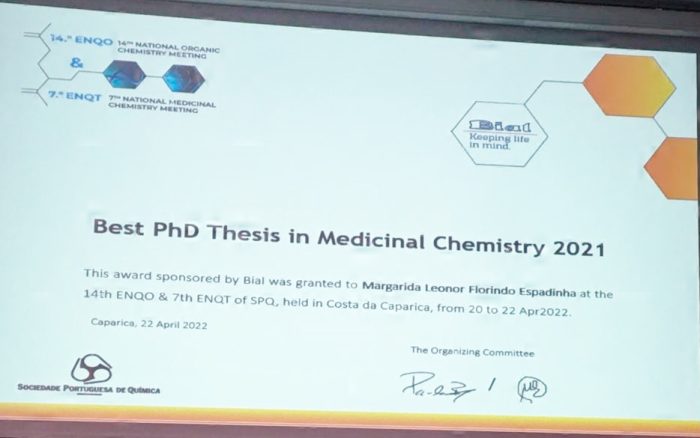April 27, 2022
iMed.ULisboa former PhD Student Margarida Espadinha awarded with Best PhD Thesis in Medicinal Chemistry 2021

Margarida Espadinha, former PhD Student of the Medicinal Organic Chemistry Lab at iMed.ULisboa received the Best PhD Thesis in Medicinal Chemistry 2021 Award at the 14th National Organic Chemistry Meeting & 7th National Medicinal Chemistry Meeting of the Division of the Portuguese Chemical Society (SPQ).
This prize is awarded by the Medicinal Chemistry Division of the Portuguese Chemical Society (SPQ) and sponsored by Bial and seeks to recognize the scientific merit of recent doctorates carried out mainly in national institutions, and is assigned based on the work developed during the PhD conducted in the area of medicinal chemistry.
The thesis titled “Design, synthesis and biological evaluation of novel p53 activators by targeting p53 protein-protein interactions” explores the design and synthesis of spiropyrazoline oxindoles and enantiopure tryptophanol derivatives as p53 activators. The p53 protein, also known as the “guardian of the genome”, has an important role in the tumor suppression and regulation of cell processes. The majority of human cancers show inactivation of the p53 pathway. This perturbation can occur either by negative regulation, either by mutation or deletion of its gene. In this project, an in silico-guided design, synthetic optimization, and biological evaluation of two libraries of spiropyrazoline oxindoles was developed and to better understand the mechanism of action of enantiopure tryptophanol derivatives as p53 activators, two types of chemical probes were prepared, and preliminary in vitro cell assays were performed to evaluate their potential in future applications. Finally, as p53 also interacts with CREBBP, and the inhibition of the p53-CREBBP PPI can result in the p53 stabilization, PROTAC technology that allows to degrade the CREBBP protein was implemented, based on a lead CREBBP ligand. Overall, this PhD thesis has provided valuable insights in the development of novel p53 activators.
Margarida Espadinha obtained her PhD degree in Pharmacy at Faculty of Pharmacy, Universidade de Lisboa in October 2021 under the supervision of Professor Maria Manuel Santos (Medicinal Organic Chemistry Lab) and co-supervison of Professors Stuart John Conway (University of Oxford) and Cecília Rodrigues (Cell Function and Therapeutic Targeting Lab).

